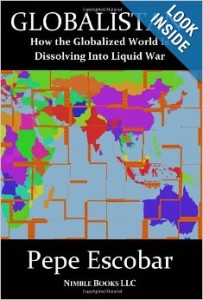
Barbarism begins at home. Alastair Crooke has shown how in an extremely polarized US “both parties” are essentially accusing each other of barbarism: “these people lie, and would stoop to any illegitimate, seditionist (i.e. unconstitutional) means, to obtain their illicit ends.”
So Caesar Act is actually leading Russia-China-Iran – the three key nodes in myriad strategies of Eurasia integration – to get closer and closer to the “barbarian” Axis of Resistance. A special feature is the complex diplomatic-energy ties between Iran and China – also part of a long-term strategic partnership. That includes even a new railway to be built linking Tehran to Damascus and eventually Beirut (part of BRI in Southwest Asia) – which will also be used as an energy corridor.

Published in 2007, far ahead of its time. Globalistan weaves three parallel and intersecting themes: globalization, energy wars and the Long War. It shows how globalization is not proceeding according to the myth of “everyone profits”: instead, it is fragmenting the world into even more explosive inequality, into “stans” – some stans configured as fortresses, some stans at war with others. Globalistan argues that the world is being dissolved into Liquid War – a natural consequence of “liquid modernity” , a concept formulated by Polish sociologist Zygmunt Bauman. The book is 80% based on reportage – from China to Central Asia and Russia; before, during and after the wars in Afghanistan and Iraq; in Iran and in the Middle East; in Western Europe, Western Africa and South America. It is also an Atlas – with maps – of the world in conflict.



